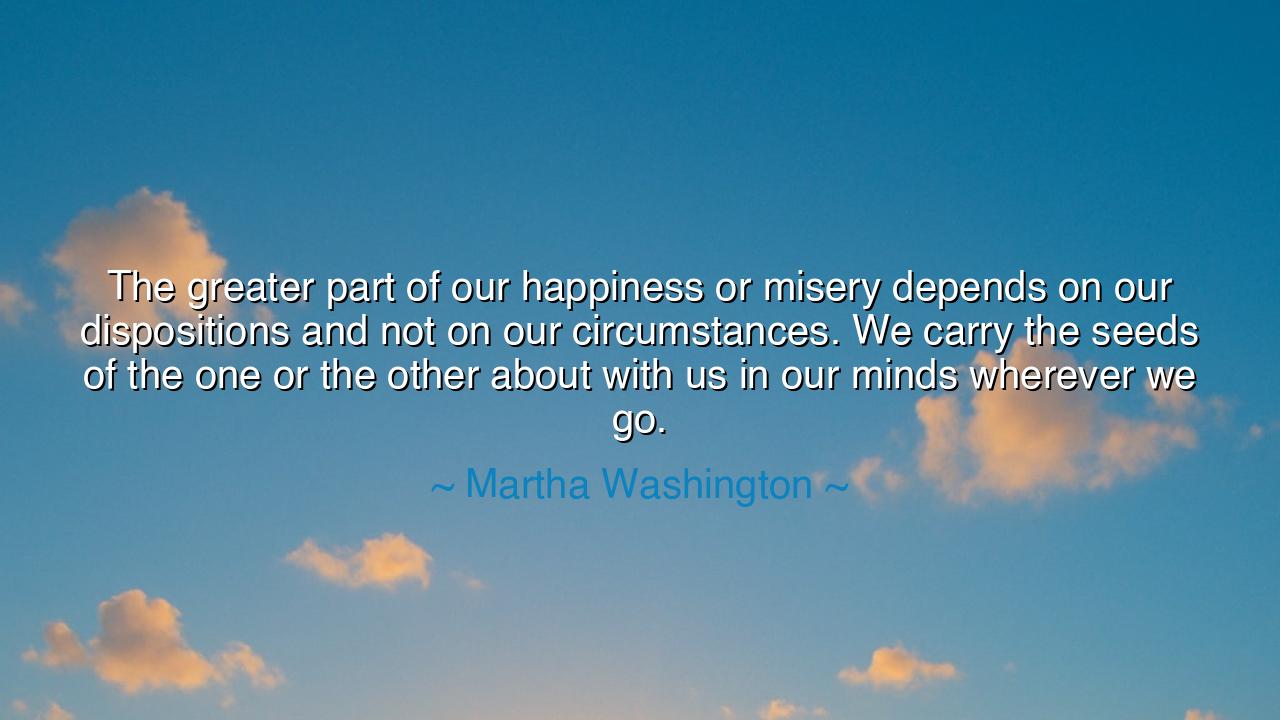
The greater part of our happiness or misery depends on our
The greater part of our happiness or misery depends on our dispositions and not on our circumstances. We carry the seeds of the one or the other about with us in our minds wherever we go.






The wise Martha Washington, wife of America’s first president and a woman of quiet strength, once said: “The greater part of our happiness or misery depends on our dispositions and not on our circumstances. We carry the seeds of the one or the other about with us in our minds wherever we go.” In these few words, she captured one of the most profound truths of human existence: that the soul, not the world, is the maker of joy or sorrow. Her words, though spoken centuries ago, still echo across the ages, for they reveal the secret that kings and paupers alike must learn—that happiness is not a matter of fortune, but of character.
The meaning of her words is simple, yet deep as a well of wisdom. Dispositions—our habitual attitudes, our ways of seeing and responding to life—are the true architects of our experience. Two people may face the same hardship, yet one grows bitter while the other grows stronger. The difference is not in their circumstances, but in the temper of their hearts. A man with gratitude in his spirit can find beauty even in the ashes of ruin; a man ruled by discontent will find misery even in abundance. Thus, the soul that learns to cultivate serenity and virtue carries its own garden of happiness wherever it walks.
The origin of this insight lies in the life of Martha Washington herself. She lived through the fires of revolution, endured long separations from her husband, and saw her home turned into a camp during war. Yet she was known for her calm, her cheerfulness, and her grace. She wrote letters filled with warmth even when surrounded by suffering. Her life was no stranger to sorrow, yet she refused to let hardship master her. Through patience and faith, she proved her own words true: that happiness is not given by the world, but grown within the heart.
History gives us other mirrors of this truth. Consider Viktor Frankl, a man imprisoned in the darkness of a Nazi concentration camp. Stripped of freedom, family, and comfort, he discovered that though man cannot always choose his circumstances, he can always choose his attitude. In his book Man’s Search for Meaning, he wrote, “Everything can be taken from a man but one thing: the last of human freedoms—to choose one’s attitude in any given set of circumstances.” In the same spirit as Martha Washington, Frankl found that even in horror, one can sow the seeds of happiness by refusing to surrender the dignity of the soul.
There is also a quiet challenge hidden in her words. To say that we carry happiness or misery within us is to accept responsibility for our inner state. It is far easier to blame fate, or fortune, or others for our unrest. But Martha Washington’s wisdom calls us to mastery of the self—to till the soil of our minds, pulling out the weeds of envy, resentment, and fear, and planting instead the flowers of gratitude and compassion. This labor of the spirit is the truest work of life. For the one who conquers himself has no master, and no circumstance can steal his peace.
Yet this mastery is not stoic coldness; it is a warm and generous strength. The content soul is not detached from life, but deeply engaged with it—able to find joy in the smallest blessings, and to face trials with courage. When the storms of the world arise, such a person remains unshaken, for their roots are sunk deep in the soil of their own spirit. The seeds of happiness that Martha spoke of are not passive—they are nourished by daily practice: gratitude, kindness, humility, and reflection. These virtues grow into a shield against the tempests of fate.
So, what lesson shall we draw from her wisdom? It is this: tend your inner garden. Do not wait for perfect circumstances, for such a day will never come. Instead, begin where you stand. Each morning, choose gratitude over complaint; each hardship, meet with patience rather than despair. Remember that every thought you nurture is a seed, and that the harvest of your life will spring from what you plant within. The world may change around you, but the true kingdom of peace lies within your keeping.
And so, as Martha Washington teaches, happiness is not a gift of chance, but the fruit of cultivation. We all carry within us the power to bloom amid the dust, to shine amid the darkness. Wherever you go, take with you the seeds of gratitude, courage, and serenity—for these will make even the roughest road radiant. The soul that has learned this truth will find paradise not in distant lands, but in the quiet strength of its own heart.






AAdministratorAdministrator
Welcome, honored guests. Please leave a comment, we will respond soon